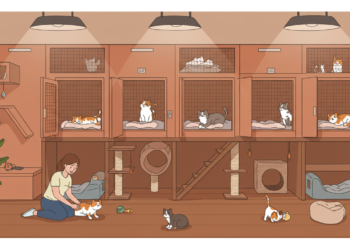Just like humans, cats can also be under stress. Obviously, the stress in cats also brings with it a great deal of negative behavior. Most cat owners are often unaware that their cat is suffering from stress. After all, the causes of stress are so diverse that stress in cats often goes unnoticed. Often owners see the stress symptoms as a change in character in their cat and unfortunately, the stress is not treated.
What are the causes of stress in your cat?
The causes of stress can be very diverse. Stress factors can be found everywhere and almost every external factor can cause stress in your cat.
Reading suggestion; Pedigree Cats: The Big And Sweet Ragamuffins Cat
- Noise: A noisy environment can be very stressful for your cat. After all, cats have a very well-developed hearing. Because cats can turn their ears to the source of the noise, cats can better distinguish different sounds. The cat’s hearing has evolved over the years in order to be able to hunt optimally. In a noisy environment, this developed hearing can cause stress with all its negative consequences.
- Environmental Threat: Cats can also experience large amounts of stress from factors that disturb their territory. Usually, it involves disturbances around their eating and sleeping places. As a result, your cat will no longer feel comfortable in the house at all and your cat will experience large amounts of stress.

How do cats express stress?
Stress in cats is associated with a wide range of physical and emotional discomfort. For example, cats will try to reduce the stress in themselves and deal with it in a certain way. However, these ways can be very disruptive to the owner or even harmful to your cat.
Reading suggestions; 200+ Unique Female Cat Names for Your Cute Companion
- Marking the territory: if your cat experiences severe stress, he or she will want to mark the territory more often. After all, your cat wants his or her safe place back. A place without stress and worries.
- Feces in the house: In extreme cases of stress, cats often leave feces in conspicuous places. For example, the cat can leave feces in the middle of the kitchen or living room.
- Running away: Sometimes the stress can really get to your cat and they will run away from home. Because the cat does not feel safe anywhere and the stress cannot escape, cats see running away as the last option.
- Getting sick: Stress can have serious consequences for your cat’s body. For example, cats that have been under a long period of stress can get sick more often.

How is stress in cats treated?
Before you can start treating stress in the cat, you must, first of all, find the cause of the stress. After all, you cannot completely solve a problem without tackling the root of the problem. Still, there are some additional methods that can help your cat overcome stress.
- A quiet place to sleep: Make sure your cat has a place to sleep away from all the crowds. A sleeping place where your cat can hide is ideal. For example, if you have children at home, make sure that no one disturbs the cat when he or she is sleeping.
- A quiet eating place: food is also of the utmost importance for a cat. So it is also important that they can eat quietly without being disturbed. After all, you don’t like to eat with people around you who stare at you.
- Minimize disruptive noise: A noisy environment can be very disruptive to your cat. Therefore, make sure that the noise in the presence of your cat is limited.
- Provide an exit: make sure your cat can always go outside. For example, you can install a cat flap on your door.
If these guidelines are followed, the stress in cats can be addressed to a great extent. Still, it’s important to address and eliminate the root cause of the stress problem to permanently eliminate the stress from your cat’s life.











